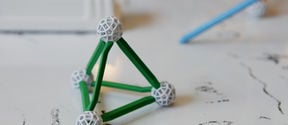Department of Mathematics and Systems Analysis
Our main research areas are algebra and discrete mathematics, analysis, applied mathematics and mechanics, stochastics and statistics, and systems analysis and operations research.

When she was in the ninth grade at school, Kaie Kubjas’ physics teacher gave the girls in her class a different test than what the boys got. The reason was that the teacher thought that girls are not as good in physics. At the time Kubjas won second place in a regional physics competition in Estonia – and she was given the boys’ test by the teacher. Now Kubjas is a professor of mathematics at Aalto University, and the Deputy Convenor of the European Women in Mathematics association.
‘Sometimes prevailing attitudes in society suggest that girls would not be good at mathematics. It is important to give encouragement to girls and young women if they are unsure of their abilities. Teachers can invite gifted girls and women to take part in training or competitions, for instance,’ Kaie Kubjas says.
‘My father studied mathematics and he never said that girls were incapable of doing mathematics or physical sciences. I was lucky that my family always encouraged my interest in mathematics,’ Kubjas adds.
Kaie Kubjas is from Estonia, a country where more than half of all mathematics students are women. Many of them also become teachers of mathematics.
‘I am surprised at the small number of women studying mathematics at Aalto. There are hardly any young women studying for a master's degree in mathematics. However, almost a quarter of the current professors are women. But where will the female professors of mathematics of the future come from if there are hardly any female students?’ Kubjas asks.
Kubjas has taken part in research around the world. In Berlin, there were some women among mathematics students, but she never saw any female professors giving lectures there. In Paris she did research at a department of computer science where she met no women as professors at all. The situation was better at an information and data systems laboratory at MIT in Boston, where there were some women both among researchers and professors.

Association activities
European Women in Mathematics is an association that was founded in 1986 and Kaie Kubjas started as its Deputy Convenor in July. It has 300-400 members. In addition to Kubjas, three researchers from Aalto are actively involved. Professor Camilla Hollanti has served as the association's treasurer for several years. Doctoral student Olga Kuznetsova is responsible for the association's website and its technical maintenance. Doctoral student Ellie Dillon writes articles for the group's newsletter and takes part in compiling the newsletter.
Activities of the association include a General Meeting, which convenes once every four years. In August 2022 it will be held in Finland. In addition, EWM events take place at the European Congress of Mathematicians also held every four years. Local events are also held in different countries. There are also mentoring programmes, travel grants being distributed, and job openings being listed.
At present European Women in Mathematics has an ongoing appeal on behalf of women and researchers with families, who are just starting their research careers. Even in the time of the coronavirus women are generally more involved in caring for family members, be they children or the elderly. On the other hand, conferences have been cancelled and other types of networking among researchers has become more difficult, and these challenges are not equally distributed. The association is appealing to universities to extend fixed-term contracts for young researchers, for example.
‘The appeal now has over 800 signatures and many organizations have also expressed their support,’ Kubjas says.
The open letter will remain open until March 2021 and you can read more about it here.

Our main research areas are algebra and discrete mathematics, analysis, applied mathematics and mechanics, stochastics and statistics, and systems analysis and operations research.


